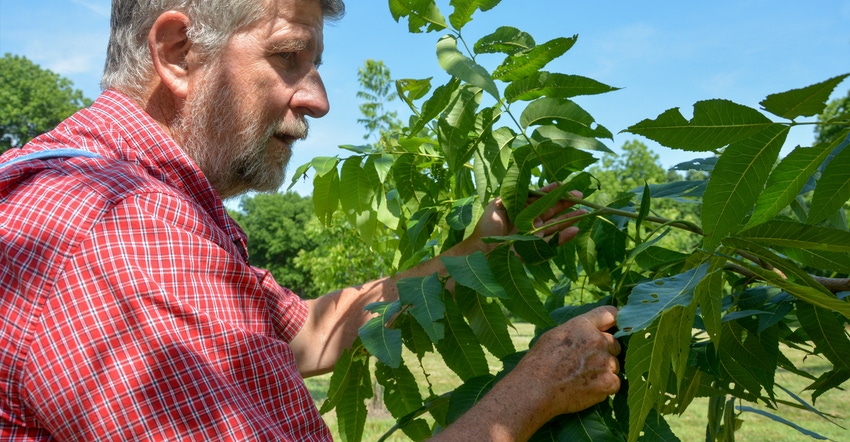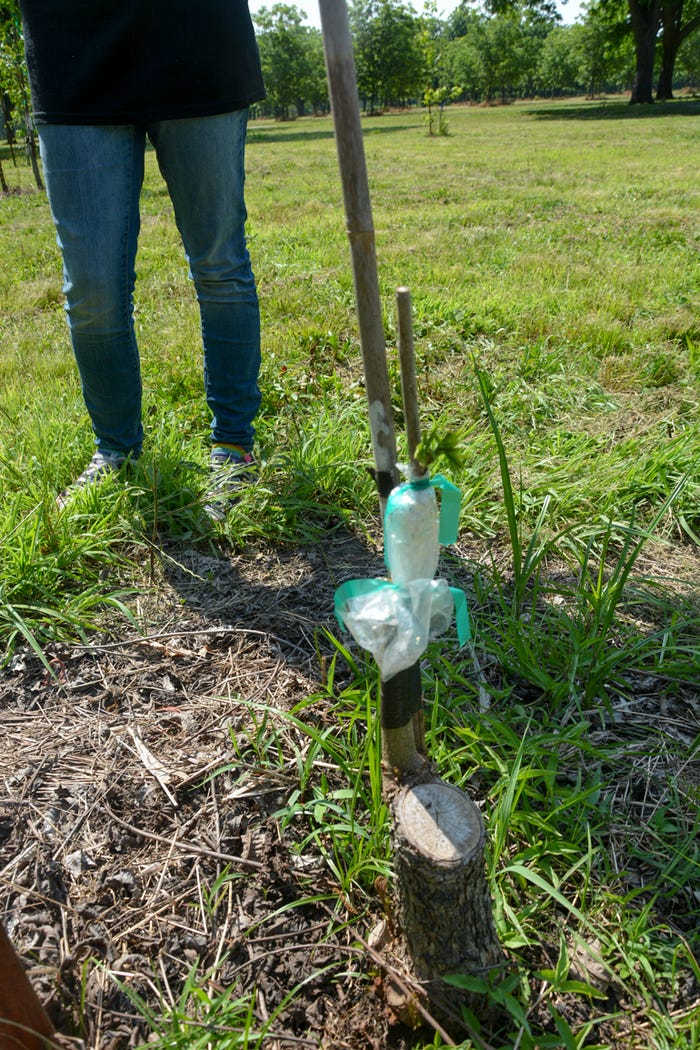
It was a little over 37 years ago that Bill Reid and his wife, Brenda, loaded up all their belongings in a Ford Courier pick-up truck and headed across the Appalachian Mountains to start a career in Kansas.
"We even had a rocking chair tied on top like the Beverly Hillbillies," Reid recalls. "We were both trained in fruit production. I started applying for jobs when I was about to graduate with my Masters from North Carolina State, and the job that was offered was here (Kansas State University Pecan Experiment Station) in Chetopa."
And so it was that the kid who grew up in New Jersey and went to college in North Carolina became a leading authority on northern pecans for thousands of students, young growers, old growers and pecan-loving hobbyists.
Along the way, Bill and Brenda "turned native," buying land and starting a berry farm and orchard as Brenda's professional enterprise and raising three children, all of whom are either college graduates or college students finishing graduate degrees.
Pecans, Reid says, offered him an opportunity to work with one of the few native species of crops available.
"There's wild rice, low bush blueberries, pinion nuts and pecans," he says.
In September of 2010, Bill joined the internet age and created a blog to explore all things pecan in "real time." The blog, which can be found at northernpecans.blogspot.com, garnered more than 1 million page views last year.
Now, the Reid era is ending. The field day on June 16 was the final one for the Pecan Experiment Station. June 30 will be Reid's last day as pecan research and Extension specialist for Kansas and Missouri, and director of research operations at the Chetopa Experiment Station. On July 1, the 80-acre pecan orchard will be closed and officially for sale.
Reid says he expects the grove to be sold to a private grower and provide someone with an opportunity to operate a profitable agricultural enterprise.
"Acre for acre, pecans are, I think, the most profitable crop in Kansas," Reid says. "In a pretty good year, you can net about $1,000 an acre on pecans. You sure can't do that with corn or beans. Not even close."
Of course, pecans are also more work, he says. The trees have to be inspected regularly for signs of insect presence or disease, and sprayed to get rid of pests. New graft wood has to be harvested, grafts made and young trees protected from damage by wildlife.
Pecan trees live to be 100 to 125 years old, and some are known to be 200 years old, Reid says. The most common causes of death are lightning strikes and a host of diseases. But just growing can end the life of a tree in a production grove.
"For commercial growers, the biggest reason for removing trees is that they get so big you can't deal with them. You can't shake them to get the nuts to fall, and one tree will spread out to cover half an acre. Since all the nuts are borne on the canopy, it makes more sense to have five trees in that space instead of one. You get more square feet of canopy that way," he says.
In Kansas, the vast majority of pecan trees are native trees that grow wild along the river bottoms in the southeast part of the state.
"They are planted either by God or by a squirrel," he says with a laugh.
Most newer, commercial groves are made up of grafted trees, meaning a preferred hybrid variety is grafted onto the trunk of a native seedling. The important thing, Reid says, is to get a hardy native root stock that is well adapted to the climate and growing conditions of the area, and then add a hybrid variety that provides a bigger, easier-to-shell nut.
In the grafting process, the trunk and roots will be the native tree while all the subsequent growth, such as nut production, will be the hybrid variety.
The most popular variety in production is Kanza — a hybrid cross made by Texas researchers, tested at the Chetopa station and named by Reid. It is grown in Kanas, Missouri, Oklahoma and Illinois, he says, and produces a good-sized, bright yellow nut with exceptional flavor.
"It also shells really well; you get more nice halves and fewer broken pieces," Reid says. "The commercial shellers like that, and they will pay more for Kanza nuts."
The Chetopa station has long been the go-to place for scion (grafting) wood to make Kanza grafts, Reid says. Next year, growers and nurseries will have to turn to the state Forest Service nurseries in Kansas or Oklahoma, or buy from commercial nurseries.
 PERSISTENCE: This graft is successful after two failures, says Bill Reid, lead researcher at the Kansas State University Pecan Experiment Station in Chetopa. Note the sprouts of new leaves coming off the graft. This new variety is one of many crosses made and released during Reid's three decades of research at the station.
PERSISTENCE: This graft is successful after two failures, says Bill Reid, lead researcher at the Kansas State University Pecan Experiment Station in Chetopa. Note the sprouts of new leaves coming off the graft. This new variety is one of many crosses made and released during Reid's three decades of research at the station.

"A fair number will probably raise their own and collect their own scion wood," Reid says.
Growers looking for grafting wood or new varieties that have been a staple of the Experiment Station won't be able to buy them there. And field days at the Experiment Station, popular with growers in Kansas, Missouri and Oklahoma, are at an end.
Reid says he will continue to work with crosses he has already made to grow out varieties, but he won't be making any new crosses. He will also continue to grow pecans on his own land.
The good news for growers and pecan lovers who count on Reid's blog is that it will not be going away.
"One of the big reasons that I decided to do it on blogspot, rather than through the University," he says. "I was looking toward retirement and I knew that was something I could keep doing."
And the ability to find Reid and ask him a question won't be going away either. It's just moving to "Brenda's Berries and Orchard." The enterprise offers red and black raspberries, blackberries, apples, pears, peaches and, of course, pecans.
Looking back on almost 4 decades of steadily building knowledge in growing fruit and nuts, Reid said he can't think of anything that he'd change.
"I can't think of anything I wouldn't do again," he said. "There might be a political thing or two back in the days before I learned that nobody is smarter than everybody else, but nothing substantial. It's been good. I've done good work."
About the Author(s)
You May Also Like




